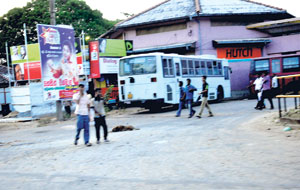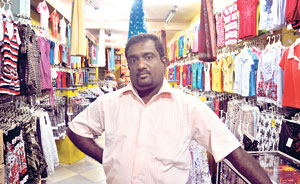The loss of the European Union’s GSP Plus benefits has caused widespread panic amongst garment sector workers who fear they may lose their jobs as factory owners look for ways to cut costs.
Only 15 Asian countries enjoy the GSP Plus benefits for trade with EU countries and Sri Lankan exporters feel they will lose their position in the market. Sri Lanka’s garment industry is likely to be the hardest hit by the suspension of the GSP Plus concessions from today as garments account for more than 50 percent of the exports to the EU countries.
 |
| A free tradezone bazaar area: No longer bustling with life |
Effects of the GSP loss have already been felt in some of the garment factories where employees who have long coped with meagre wages are struggling to obtain their salary revisions and overtime payments.
A Sunday Times team visited the Free Trade Zone in Awariyawatta where workers from many of the surrounding factories were eager to speak of the problems they were facing at their workplaces.
A.S. Madushanka, a Works Inspector at a shoe factory, said the employees were not receiving their salary increments on time.
“In January we were supposed to receive an increment of Rs. 500 but the administration told us that because orders were not coming in, it would have to delay the increments by four months,” he said.
He said the shoes made in the factory were sold all over the world including, China, the United States and the European markets with the average price of a pair of shoes being about Rs.20,000. Ye the minimum wage at the factory was a meagre Rs. 8000.
Sri Lanka received a 10% tax concession from the GSP Plus Scheme alone. With 65% of the exports to the EU being garments, experts believe the revenue loss will range from 15% to 20%.
Garment factory workers told us that they believed that some owners were closing down their factories on the basis of the suspension of the GSP, but reopening them elsewhere to cut cost and avoid paying compensation to the workers.
Madara Lakmini, who has worked for nearly 10 years in an garment factory, said she feared that the owners might close down the factory and thousand workers would lose their jobs. This would not bother them.
“The executives apparently don’t care because they can get jobs in other companies but we will be left destitute. We have no one to listen to our woes and there are instances where thugs have been used to suppress any protest action,” she said.
Lakmini said every employee worked 60 hours a week with an additional 60 hours of overtime every month. She said she believed the work period would be reduced significantly for cost cutting purposes. She said increments had also not been given despite a union strike in February.
Iron Operator Nishan Pushpakumara said the general salary level at their factory was around Rs.5,000 a month, much less than others in the zone.
He charged that the administration was also taking action against employees who had voiced their protests.
 |
| With few customers, this textile shopowner has little to smile about |
“They make our work difficult and unpleasant apparently hoping we will quit. Most of those who have worked for around one or two years will probably leave the factory,” he said.
Apart from the workers who have been directly affected, many of the surrounding businesses are also feeling the pinch. The usually bustling night bazaar in the area where hundreds of workers would shop before going home was already beginning to show signs of losing business.
Senarath Widanaratne, owner of a clothing stall at the night bazaar, said his business had taken a bad hit since the workers were facing difficulties.
“With the cost of living increasing and the employees getting less money into their hands what do they have left to spend on clothes and the likes. My earnings have fallen by 50% and it has also affected the way in which I have been able to take care of my family,” he said.
Mr. Widanaratne who opened his shop around five years ago said this problem started last year.
M.H.T. Sunil, owner of New Ruhunapura Textiles, standing outside his empty shop, said his earnings had diminished by as much as 75% and during 17 years of doing business in the area he had not seen such a lean period.
Meanwhile, trade union leaders have accused the government and factory owners of doing little to resolve the crisis arising from the loss of the GSP Plus concessions.
The GSP Pus scheme gives duty free access to the European Union for around 7,200 products from various small and developing countries which have implemented internationally-recognised environmental, human rights and good-governance agreements. Sri Lanka was awarded the GSP Plus to facilitate its recovery following the Tsunami in 2004.
Wasantha Samarasinghe, President of the Inter-company Employees Union, said the withdrawal of the GSP Plus facility had put Sri Lanka in a position where it had lost its advantage in competing with other countries for the same market.
“Some factories are likely to close down and the worst-hit will be the workers who already work for very low wages,” he said.
Anton Marcus, President of the Progressive Free Trade Zone General Services Employees Union, said the full effect of losing the GSP Plus benefits would be felt in the months to come.
He said the unions had told the government that it should act effectively to ensure the continuation of the GSP Plus benefits, but the government had failed miserably. “The very parties that said that the GSP plus benefits will not be needed are now talking about financial difficulties and cutbacks to escape from minimum wage increments,” he said.
Mr. Marcus charged that owners of large garment factories were receiving many benefits from the government but showed little concern for their workers. |



